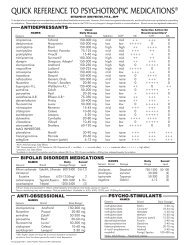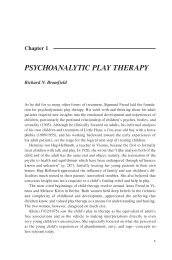IRAQ WAR CLINICIAN GUIDE
Iraq War Clinician's Guide - Network Of Care
Iraq War Clinician's Guide - Network Of Care
You also want an ePaper? Increase the reach of your titles
YUMPU automatically turns print PDFs into web optimized ePapers that Google loves.
Iraq War Clinician Guide 25 Background and Assessment<br />
there may be one or two specific traumatic events burned into the consciousness of returning<br />
soldiers that plague them psychologically, traumatic events need to be seen in the context of the<br />
totality of roles and experiences in the war-zone. In addition, research has shown convincingly<br />
that while exposure to trauma is a prerequisite for the development of significantly impairing<br />
PTSD, it is necessary but not sufficient. For veterans, there are a host of causes of chronic PTSD. In<br />
terms of war-zone experiences, perceived threat, low-magnitude stressors, exposure to suffering<br />
civilians suffering, and exposure to death and destruction, have each been found to contribute to<br />
risk for chronic PTSD. It should also be emphasized that the trauma of war is colored by a variety<br />
of emotional experiences, not just horror, terror, and fear. Candidate emotions are sadness about<br />
losses, or frustration about bearing witnessing to suffering, guilt about personal actions or<br />
inactions, and anger or rage about any number facets of the war (e.g., command decisions, the<br />
behavior of the enemy).<br />
We describe below the types of stressful war-zone experiences that veterans of the first Persian<br />
Gulf War reported as well as the psychological issues and problems that may arise as a result. We<br />
assume that many of these categories or themes will apply to returnees from the War with Iraq.<br />
Preparedness. Some veterans may report anger about perceiving that they were not sufficiently<br />
prepared or trained for what they experienced in the war. They may believe that they did not have<br />
equipment and supplies they needed or that they were insufficiently trained to perform necessary<br />
procedures and tasks using equipment and supplies. Some soldiers may feel that they were ill<br />
prepared for what to expect in terms of their role in the deployment and what it would be like in<br />
the region (e.g., the desert). Some veterans may have felt that they did not sufficiently know what<br />
to do in case of a nuclear, biological, or chemical attack. Clinically, veterans who report feeling<br />
angry about these issues may have felt relatively more helplessness and unpredictability in the warzone,<br />
factors which that have been shown to increase risk for PTSD.<br />
Combat exposure. It appears that the new lraq War entails more stereotypical exposure to warfare<br />
experiences such as firing a weapon, being fired on (by enemy or potential friendly fire),<br />
witnessing injury and death, and going on special missions and patrols that involve such<br />
experiences, than the ground war offensive of the Persian Gulf War, which lasted three days.<br />
Clinicians who have extensive experience treating veterans of other wars, particularly Vietnam,<br />
Korea, and WWll should be aware of the bias this may bring to bear when evaluating the<br />
significance or impact of experiences in modern warfare. Namely, clinicians need to be careful<br />
not to minimize reports of light or minimal exposure to combat. They should bear in mind that in<br />
civilian life, for example, a person could suffer from chronic PTSD as a result of a single, isolated<br />
life-threat experience (such as a physical assault or motor vehicle accident).<br />
Aftermath of battle. Veterans of the new lraq War will no doubt report exposure to the<br />
consequences of combat, including observing or handling the remains of civilians, enemy soldiers,<br />
US and allied personnel, or animals, dealing with prisoners of war, and observing other<br />
consequences of combat such as devastated communities and homeless refugees. Veterans may<br />
have been involved in removing dead bodies after battle. They may have seen homes or villages<br />
destroyed or they may have been exposed to the sight, sound, or smell of dying men and women.<br />
These experiences may be intensely demoralizing for some. It also is likely that memories of the<br />
aftermath of war (e.g., civilians dead or suffering) are particularly disturbing and salient.<br />
Perceived threat. Veterans may report acute terror and panic and sustained anticipatory anxiety<br />
about potential exposure to circumstances of combat, including nuclear (e.g., via the use of<br />
DEPARTMENT OF VETERANS AFFAIRS<br />
NATIONAL CENTER FOR PTSD




